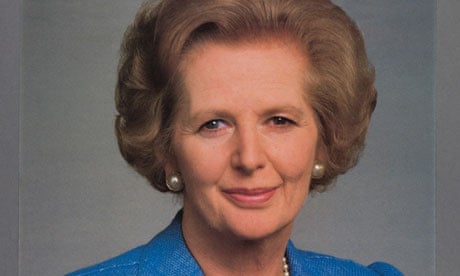Many gay, lesbian, bisexual and transgender people are sincerely and deeply mourning Margaret Thatcher's passing. The gay entrepreneur Ivan Massow called her "a poster girl for gay rights" and said that, despite her being "pilloried for letting section 28 go through on her watch … her attitude to homosexuality is often misunderstood". Indeed, Pink News described her just as a "controversial figure on gay issues", noting that the artists Gilbert and George described her as a "gay icon".
It's illogical to think that people of a shared sexuality would also share politics. Thatcher's awesome belief in herself and in her vision for Britain, her commitment to the rights of the individual and sweeping economic policies, found her many like-minded gay supporters. But, despite the Boadicea-like Commons performances, the hair, handbag and all the other hard to resist superficialities, the reality is that Thatcher presided over and took advantage of the most devastatingly homophobic time in recent British history.
If you were a gay man in the mid to late 80s – let alone a teenager, as I was – you were one of the unlucky ones. The kick in the teeth was far from metaphorical. When a terrifying new disease began cutting down gay men like rows of corn, the media, most vociferously led by the Sun's then editor, Kelvin MacKenzie, launched a campaign of deeply unpleasant propaganda. Knowing that hated Labour politicians such as Ken Livingstone were actively supportive of gay equality, the rightwing media seized their opportunity. "Pulpit poofs" were hounded from the church, playground workers were exposed as "lesbians plotting to pervert nursery tots", celebrities such as Kenny Everett, Russell Harty and Freddie Mercury were hounded as diseased vermin. Features such as "Poofs in pop" (written by one P Morgan) were run, and the News of the World published the home address of "EastBenders" star Michael Cashman.
The Sun reported a joke that went like this: "A gay man goes home to his parents and tells them he's got good news and bad news. The bad news is I'm gay. The good news is I've got Aids." One senses that MacKenzie reached his zenith when he reported calls by Tory politicians to recriminalise gay sex or to, as one councillor suggested, gas gay men to "fight Aids".
One would imagine anyone with an ounce of humanity would want to distance themselves from this as much as possible. Thatcher used it to make political capital. The 1987 election saw Tory ad campaigns trying to portray Labour as actively trying to pervert children. One billboard showed a line of young men wearing badges such as "Gay pride" and "Gay sports day" with a slogan, "This is Labour's camp. Do you want to live in it?".
After winning the 1987 election Thatcher knew she was on to a winner. She denounced local education authorities for teaching children that "they have an inalienable right to be gay" and brought in the hated clause, then section, 28, which outlawed the promotion of homosexuality as "a pretend family relationship". Despite the fact that no one was ever prosecuted under it, the law made teachers feel they could not tell kids that if they were gay, it was OK. It effectively scared them from talking about being gay even when children were being physically attacked.
Some gay men who knew her have said she liked gay people individually. The journalist and former Conservative MP Matthew Parris says that Thatcher told him she appreciated the difficulty he had in coming out to her. The day before she resigned she awarded Ian McKellen a knighthood. When Norman Fowler set up a high-profile campaign to educate the public about HIV and Aids she didn't stop him – good of her. Most symbolically, they say, she was one of the few Tories to vote for the decriminalisation of homosexuality in 1967. Whoop-dee-doo. One of the arguments of that time was that gay people should be free from threat of prison so they could "seek treatment". More telling is the fact that when Lady Young led the campaign against Tony Blair's scrapping of section 28 in 2000, Thatcher made her support known by sitting next to Young in the Lords for the vote.
I never met her. Maybe Thatcher didn't hate gay people that she knew. This makes it more despicable that she was willing to throw us – including kids like me, desperate for help in 1988 when section 28 came in – to the wolves for the sake of a few poll points. What she did do was inflict huge damage on a community that desperately needed support, and smashed down any possibility of supporting confused children or educating them about how to not catch HIV.
Twenty-five years later we've just had the highest rates of HIV infection among gay and bisexual men, we're blighted by significantly higher levels of drug and alcohol misuse, and teachers tell me that some of their colleagues are under the misapprehension that section 28 is still in force. Even in 2013, two schoolchildren – that we know of – have taken their own lives probably partly because of homophobic bullying. Feel free to admire her economic policy, her retaking of the Falklands, whatever, if you so wish, but when it comes to LGBT issues, to see Thatcher as anything other than a poster girl for the wrongs done to gay people is a wilful delusion.
